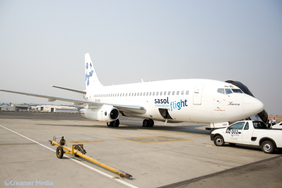Sasol is an integrated energy and chemical company based in Sandton, South Africa. The company was formed in 1950 in Sasolburg (South Africa), and is the world's first oil-from-coal company, which develops and commercializes technologies, including synthetic fuels technologies, and produces different liquid fuels, chemicals and electricity.
Significant cash and cost change programs implemented since 2014 have placed Sasol in the strongest possible position to respond to the volatile macro-economic environment and enabled it to stay profitable in a low oil price environment. In 2017 Sasol was among very few oil and chemical companies globally who were able to generate positive free cash flows from its core operations at oil prices of $ 40/bbl.
According Annual Integrated Report 2017 Sasol has delivered a strong business performance across most of the value chain. In 2017 Sasol delivered record production volumes at Secunda Synfuels, which increased by 1% to a record 7.83 million tons. Due to stronger product demand Sasol increased the production from the Eurasian Operations by 6%, which is their highest production volume since 2015.
The turnover in 2017 remained flat at R 172,407 million, while EBIDTA decreased by 7.9% from R 53,992 million in 2016 to R 49,751 million in 2017. The Performance of the Chemical Business reported a 2% increase in sales volumes, mainly as a result of stronger demand and improved plant stability. Sasol´s Base Chemical sales volumes increased by 3%, slightly below market guidance, due to extended shutdowns at chlorvinyls and polypropylene plants and a fire at a third party warehouse. Liquid fuels sales volumes in Sasol´s Energy Business decreased by 2% due to a greater portion of production volumes from Secunda Synfuels Operations (SSO). Natref refinery production volumes decreased by 5% due to the plant shutdowns during the first half of the year. The liquid fuels sales volumes increased by 1%.
The earing per share (EPS) increased by 54% to R 33.36 compared to the previous year. The previous year EPS was negatively impacted by the R 9.9 billion selling of Canadian shale gas assets. Core headline earnings increased by 6% (R 2.29 per share) compared to the previous year.
In 2017 Sasol had negative free cash flow of R16 billion (compared to R 23.2 billion in 2016) mainly due to the significant capital expenditure in the year of R 60.3 billion.
Cash generated by operating activities decreased by 19% to R 44.1 billion compared with R 54.7 billion in the previous year. The net cash position decreased significantly by 44%, from R 52.2 billion at the beginning of the year (as per 30 June 2016) to R 29.3 billion at the end of the year (as per 30 June 2017), mainly due to the funding of the Lake Charles Chemical Project in the US and the effect of a stronger closing Rand/US dollar exchange rate.
Over the past three years, Sasol have made capital investments of R 179 billion, of which R 60.3 billion was invested in 2017, mainly focused on projects in South Africa, Mozambique and the United States, with some investments in Canada, Germany and Qatar. This relates primarily to the Lake Charles Chemicals Project (LCCP)[1] in the US and the Mozambique Production Share Agreement (PSA)[2] project. By the end of the year the LCCP was 74% complete and on track for the start-up of the first units in the second half of calendar 2018. The PSA surface facilities project was on track, having achieved 74.5% progress on detail engineering and procurement activities required in support of the detail design and preparation for site construction. Since 2011, around 80% of Sasol´s capital projects have been completed on or under budget.
Sasol extended their research to improve proprietary technologies. By the non-equity licensing out of Sasol’s LTFT™ GTL technology to Uzbekistan, Sasol is securing their GTL resources and have an opportunity to continue to optimize the technology.
In 2017 Sasol invested R 1 billion in research and development in all mega-projects, with a particular focus on LCCP and the PSA.
In 2017 Sasol licensed out (in a non-equity manner) their proprietary Sasol Slurry Phase LTFT™ licence and associated water technologies.
Sasol started commercial utilization of Sasol´s next generation technology Fischer-Tropsch GTL catalyst in the EGTL plant in Nigeria.
[1] The Lake Charles Chemicals Project (LCCP) in the US is of strategic importance to Sasol. The first units of the LCCP are on track to reach beneficial operation in the second half of calendar year 2018. The funding of the LCCP has been secured by using cash generated from Sasol´s own operations and various borrowing facilities.
[2] The Production Sharing Agreement (PSA) project in Mozambique is progressing according to plan, with six of the 13 wells already drilled. Sasol plans to use the gas from this project both in Mozambique and for South African operations as the company explores opportunities to operate in a lower-carbon economy.
